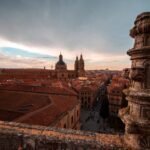Ronald Harry Coase was born in Willesden, just outside London, on 29 December 1910. This economist was awarded the Nobel Prize in Economics in 1991 for “having discovered and elucidated the significance of transaction costs and property rights in the institutional structure and functioning of the economy”.
This only child was brilliant, but he started school at a school for the disabled because of a leg impairment, which meant that he was a year late entering school. As a result of this handicap, he could not choose history as his main subject at university, so in 1929 he took a degree in commerce at the LSE (London School of Economics).
After entering the LSE, he meets the British economist Plant, who Coase himself says changes his life. Plant influences how Ronald Coase approaches the economic system and helps him obtain a scholarship with which he manages to move to the United States to study the structure of American industry and understand the reasons for its organisational peculiarities.
In 1951, he arrived in the United States, where he began teaching at the University of Buffalo. He went on to teach at other universities, including the University of Virginia in Charlottesville and the University of Chicago Law School, where he spent most of his career. He was editor of the Journal of Law and Economics and a member of the Mont Pelerin Society.
In this research, he succeeded in establishing a new and instrumental economic analysis, the transaction costs, which, according to Coase himself, constitute the primary reason for the creation of companies.
Works by Ronald Coase
Among the main contributions of Ronald Coase are the Theory of Transaction Costs and the Coase Theorem of Externalities and Property Rights. The first article conceived by Coase was “The Nature of the Firm” between 1966 and 1980, which was widely cited in academic journals.
Another of his widely cited articles was “The Problem of Social Cost“, with several relevant citations between 1966-1980.
It is important to note that Ronald Coase was the fifth Briton to win the Nobel Prize in Economics, and like all his predecessors, he studied at the LSE.





